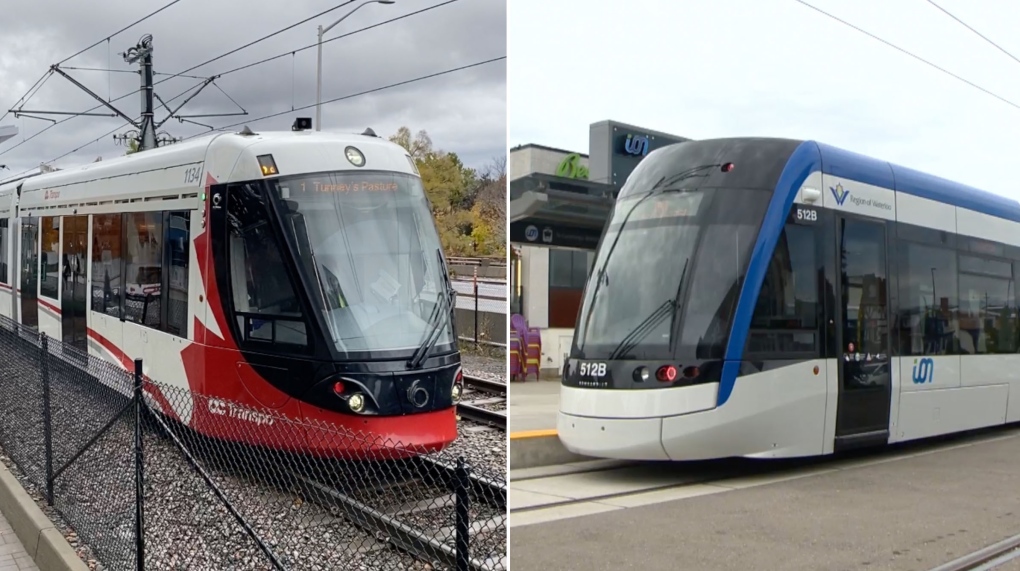Contrasting Ottawa's LRT problems with Kitchener-Waterloo's success story
 Ottawa (left) and Kitchener-Waterloo (right) LRT trains.
Ottawa (left) and Kitchener-Waterloo (right) LRT trains.
It is a tale of two light rail transit systems. In Ottawa, ridership levels have not recovered from the COVID-19 pandemic, but in Kitchener-Waterloo, levels are at record highs.
According to numbers from the city of Ottawa, overall ridership in September was at 72 per cent of pre-pandemic levels, with bus boardings at 85 per cent and O-Train boardings at 49 per cent.
Pat Scrimgeour, director of transit customer systems and planning, says "Downtown-oriented, long distance commuter-oriented are down with so many people working from home either all of the time, or some of the time, so train ridership is a little lower, and bus ridership a little higher than the system average."
The Confederation Line taking a brunt of the low ridership. "The train is serving mostly people who are traveling to, though, and from downtown and downtown is very heavily office employment, and those are the people we understand are working from home."
In the region of Kitchener-Waterloo, their transit service had its busiest month ever in September, with ridership peaking at 2.9 million customer trips. Ridership is up 33 per cent over September 2019, and 44 per cent over 2022. Boarding numbers are also up according to officials. In September, boardings were 43 per cent higher than the average month this year, hitting 3.8 million. An average month for the region is 2.6 million boardings.
The Kitchener-Waterloo LRT launched only three months before Ottawa's.
Colleen James is a councillor with Waterloo region, and says the transit system did take a big hit during the pandemic, but has built back a strong ridership.
"Part of our big success, has to do with the students who we have here. Students are taking transit, cars are too expensive, gas is expensive, and really pushing and building a system that works to get people right through the corridor, which is what we are building, as well."
Unlike Ottawa's problem-plagued system that has included derailments, major outages, and now single-car trains that run more slowly, Kitchener has been relatively problem-free. James says there were growing pains, as well as adjustment for all drivers, but providing public transit options grew their base.
"Making sure there are options and building a route that really goes through our corridor, building development around there as well," James says, "It works, it is dependable. Building trust around the system is a huge part of why people use the system."
Light rail in Kitchener runs along a 19-kilometer track and has 19 stops. Ottawa's Confederation line is 12.5 kiometers and has 13 stops. Scrimgeour says, "They are a different city and their ridership patterns are different. We have historically had very high transit numbers for a city our size and that high ridership has come from a lot of office workers choosing transit."
"Like us, their university based, or school based ridership is likely as high as it was pre-pandemic or perhaps higher."
But Scrimgeour admits that boosting Ottawa's ridership also needs to be about improving the system overall. "We need to be here to move the people who have somewhere to go, in order to do that we need to have a service that is reliable, useful, and comfortable that people can count on. That means we need to have bus service reliability that is better than it has been and it definitely means we need to have train reliability than we have had the past couple of years."
CTVNews.ca Top Stories

Here's where Canadians are living abroad: report
A recent report sheds light on Canadians living abroad--estimated at around four million people in 2016—and the public policies that impact them.
'We are declaring our readiness': No decision made yet as Poland declares it's ready to host nuclear weapons
Polish President Andrzej Duda says while no decision has been made around whether Poland will host nuclear weapons as part of an expansion of the NATO alliance’s nuclear sharing program, his country is willing and prepared to do so.
Harvey Weinstein hospitalized after return to New York from upstate prison
Harvey Weinstein’s lawyer said Saturday that the onetime movie mogul has been hospitalized for a battery of tests after his return to New York City following an appeals court ruling nullifying his 2020 rape conviction.
Deadly six-vehicle crash on Highway 400 sparked by road rage incident
One person was killed in a six-vehicle crash on Highway 400 in Innisfil Friday evening.
Invasive and toxic hammerhead worms make themselves at home in Ontario
Ontario is now home to an invasive and toxic worm species that can grow up to three feet long and can be dangerous to small animals and pets.
Central Alberta queer groups react to request from Red Deer-South to reinstate Jennifer Johnson to UCP caucus
A number of LGBQT+2s groups in Central Alberta are pushing back against a request from the Red Deer South UCP constituency to reinstate MLA Jennifer Johnson into the UCP caucus.
Opinion I just don't get Taylor Swift
It's one thing to say you like Taylor Swift and her music, but don't blame CNN's AJ Willingham's when she says she just 'doesn't get' the global phenomenon.
Sophie Gregoire Trudeau on navigating post-political life, co-parenting and freedom
Sophie Gregoire Trudeau says there is 'still so much love' between her and Prime Minister Justin Trudeau, as they navigate their post-separation relationship co-parenting their three children.
First court appearance for boy and girl charged in death of Halifax 16-year-old
A girl and a boy, both 14 years old, made their first appearance today in a Halifax courtroom, where they each face a second-degree murder charge in the stabbing death of a 16-year-old high school student.

































